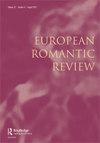浪漫主义的同类
IF 0.1
0 HUMANITIES, MULTIDISCIPLINARY
引用次数: 0
摘要
本次专题讨论以创新的方式思考浪漫主义和“与其他生物共享地球的问题”。在过去的几十年里,人类与动物关系的危机已经恶化到一个地步,它已经越来越被认为是全球环境危机的一个组成部分。与气候危机一样,“动物危机”起源于19世纪初英国资本主义工业形式的出现。对这一历史星座的欣赏可以也应该成为更新浪漫主义动物研究的基础。然而,阅读浪漫主义作为对当代人类与动物关系危机的历史根源的反思,反过来需要重新思考和公开辩论的主题、档案和方法。为了表明我们努力的初步结果和风格,我们选择不总结提交的论文,而是提出十个集体制定的问题,并以个人的身份简要回答其中的三个问题。总的来说,我们不仅希望为我们认为的浪漫主义研究的一个重要领域提出一个论点,而且希望鼓励更多关于这个主题的研究。本文章由计算机程序翻译,如有差异,请以英文原文为准。
Romanticism’s Fellow Creatures
ABSTRACT This panel opens up innovative ways of thinking about Romanticism and “the problem of sharing our earth with other creatures.” Over the last couple of decades, the crisis in human relations with animals has deteriorated to the point that it has become increasingly recognized as a constitutive part of the global environmental crisis. Like the climate crisis, the “animal crisis” originates with the emergence of the industrial form of capitalism in Britain around the turn of the nineteenth century. Appreciation of this historical constellation can and should become the basis of a renewed Romantic animal studies. However, reading Romanticism as a reflection of and on the historical origins of the contemporary crisis in human-animal relations in turn requires rethinking and openly debating topics, archive, and method. To indicate the initial results and style of our efforts, we have chosen not to summarize the papers presented, but rather to pose ten collectively formulated questions and to briefly answer as individuals a selection of three of those questions. Overall, we hope not just to make an argument for what we regard as a vital area of research in Romantic studies, but to encourage more research on the topic.
求助全文
通过发布文献求助,成功后即可免费获取论文全文。
去求助
来源期刊

European Romantic Review
HUMANITIES, MULTIDISCIPLINARY-
CiteScore
0.30
自引率
50.00%
发文量
61
期刊介绍:
The European Romantic Review publishes innovative scholarship on the literature and culture of Europe, Great Britain and the Americas during the period 1760-1840. Topics range from the scientific and psychological interests of German and English authors through the political and social reverberations of the French Revolution to the philosophical and ecological implications of Anglo-American nature writing. Selected papers from the annual conference of the North American Society for the Study of Romanticism appear in one of the five issues published each year.
 求助内容:
求助内容: 应助结果提醒方式:
应助结果提醒方式:


